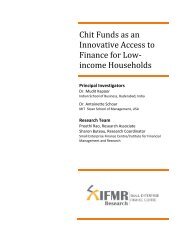Government of India Volume I: Analysis and Recommendations
Government of India Volume I: Analysis and Recommendations
Government of India Volume I: Analysis and Recommendations
You also want an ePaper? Increase the reach of your titles
YUMPU automatically turns print PDFs into web optimized ePapers that Google loves.
ANNEXES<br />
3. On the issue <strong>of</strong> co-operatives which collect monies from members/ shareholders,<br />
this WG recommends that any co-operative society accepting deposits exceeding<br />
a specified value must fall within the regulatory purview <strong>of</strong> the banking regulator.<br />
Co-operative banks are currently regulated under Part V <strong>of</strong> the Banking Regulation<br />
Act, 1949 (BR Act), but many provisions in the BR Act are not applicable to them.<br />
This WG recommends that such exclusions be removed. Co-operative banks must<br />
be treated at par with banking companies. This WG also endorses the policy recommendations<br />
<strong>of</strong> the Malegam Report on Urban Co-operative Banks (2011). To<br />
deal with the problem <strong>of</strong> dual control, the Committee recommends the creation<br />
<strong>of</strong> a new organisation structure for Urban Cooperative Banks (UCBs) consisting <strong>of</strong><br />
a board <strong>of</strong> management in addition to the board <strong>of</strong> directors. The board <strong>of</strong> directors<br />
would be elected in accordance with the provisions <strong>of</strong> the respective State Cooperative<br />
Societies Acts or the Multi-State Co-operative Act, 2002 <strong>and</strong> would be<br />
regulated <strong>and</strong> controlled by the Registrar <strong>of</strong> Co- operative Societies. The board <strong>of</strong><br />
directors would establish a board <strong>of</strong> management, which shall be entrusted with<br />
the responsibility for the control <strong>and</strong> direction <strong>of</strong> the affairs <strong>of</strong> the Bank assisted by<br />
a CEO who shall have the responsibility for the management <strong>of</strong> the Bank. RBI would<br />
have powers to control <strong>and</strong> regulate the functioning <strong>of</strong> the Bank <strong>and</strong> <strong>of</strong> its board <strong>of</strong><br />
management <strong>and</strong> <strong>of</strong> the Chief Executive Officer (CEO) in exactly the same way as it<br />
controls <strong>and</strong> regulates the functioning <strong>of</strong> the Board <strong>and</strong> the Chief Executive in the<br />
case <strong>of</strong> a commercial bank.<br />
4. On the issue <strong>of</strong> companies accepting deposits, the members <strong>of</strong> the WG deliberated<br />
at length. It was pointed out to the WG that the RBI had, in its presentation before the<br />
Commission submitted that; “Only banks, statutory corporations, companies <strong>and</strong><br />
co-operative societies regulated by the RBI should be allowed to accept deposits<br />
from public”. While some members were <strong>of</strong> the opinion that the issue <strong>of</strong> companies<br />
accepting deposits is beyond the purview <strong>of</strong> this WG, other members expressed the<br />
opinion that deposit taking activities should be restricted only to banks. On the<br />
question <strong>of</strong> whether this issue falls within the ambit <strong>of</strong> this WG, the members deliberated<br />
that the Reserve Bank <strong>of</strong> <strong>India</strong> Act, 1934 (RBI Act) already prohibits partnership<br />
firms from accepting deposits. Hence some members <strong>of</strong> the WG recommended<br />
extending this prohibition to corporates accepting deposits as well. This requires<br />
amending Section 58A <strong>of</strong> the Companies Act, 1956. The proposed Companies Bill <strong>of</strong><br />
2011 is a step in this direction. It places restrictions on the acceptance <strong>of</strong> deposits by<br />
companies. It lays down the procedure for acceptance <strong>of</strong> deposits by members. A<br />
limited class <strong>of</strong> companies including banks <strong>and</strong> non- banking financial companies<br />
are allowed to accept deposits from public.<br />
5. On the issue <strong>of</strong> NBFCs, this WG recommends that deposit taking NBFCs must obtain a<br />
license to operate as a bank <strong>and</strong> will fall within the regulatory purview <strong>of</strong> the banking<br />
regulator. The class <strong>of</strong> NBFCs that do not accept deposits from public will not<br />
be regulated by the banking regulator.<br />
6. This WG also considered <strong>and</strong> debated the recommendations <strong>of</strong> Vickers Report (2011)<br />
<strong>and</strong> on the issue <strong>of</strong> ring fencing:<br />
(a) This WG recognises the significant role played by NBFCs in providing finance.<br />
However, with a view to systemic risk oversight, this WG recognises that credit<br />
linkages between banking <strong>and</strong> non-bank finance should be subject to appropriate<br />
regulatory oversight from the viewpoints <strong>of</strong> both micro-prudential regulation<br />
<strong>and</strong> systemic risk regulation.<br />
(b) Once transition to the Financial Holding Company (FHC) structure, as contained<br />
in the recommendation <strong>of</strong> this WG, is achieved subsidiaries <strong>of</strong> banks<br />
must only do such activities which banks themselves can undertake.<br />
FINANCIAL SECTOR LEGISLATIVE REFORMS COMMISSION 183



